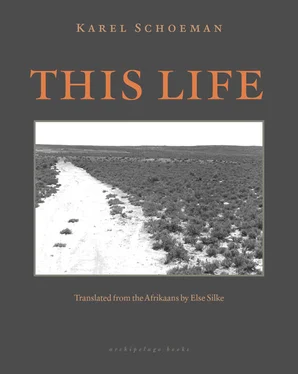Karel Schoeman - This Life
Здесь есть возможность читать онлайн «Karel Schoeman - This Life» весь текст электронной книги совершенно бесплатно (целиком полную версию без сокращений). В некоторых случаях можно слушать аудио, скачать через торрент в формате fb2 и присутствует краткое содержание. Год выпуска: 2015, ISBN: 2015, Издательство: Archipelago, Жанр: Современная проза, на английском языке. Описание произведения, (предисловие) а так же отзывы посетителей доступны на портале библиотеки ЛибКат.
- Название:This Life
- Автор:
- Издательство:Archipelago
- Жанр:
- Год:2015
- ISBN:978-0-914671-16-9
- Рейтинг книги:5 / 5. Голосов: 1
-
Избранное:Добавить в избранное
- Отзывы:
-
Ваша оценка:
- 100
- 1
- 2
- 3
- 4
- 5
This Life: краткое содержание, описание и аннотация
Предлагаем к чтению аннотацию, описание, краткое содержание или предисловие (зависит от того, что написал сам автор книги «This Life»). Если вы не нашли необходимую информацию о книге — напишите в комментариях, мы постараемся отыскать её.
considers both the past and future of the Afrikaner people through four generations of one family. In an elegiac narrator's tone, there is also a sense of compulsion in the narrator's attempts to understand the past and achieve reconciliation in the present. This Life is a powerful story partly of suffering and partly of reflection.
This Life — читать онлайн бесплатно полную книгу (весь текст) целиком
Ниже представлен текст книги, разбитый по страницам. Система сохранения места последней прочитанной страницы, позволяет с удобством читать онлайн бесплатно книгу «This Life», без необходимости каждый раз заново искать на чём Вы остановились. Поставьте закладку, и сможете в любой момент перейти на страницу, на которой закончили чтение.
Интервал:
Закладка:
After Pieter’s death Annie and her daughter remained in the old homestead, for she was a reserved woman who bothered no one and it was handy for Stienie to be able to call on her for help when she entertained. She received firewood and meat, and Maans must have given her a small sum of money to survive, for Pieter had had nothing to leave her. Maans was quite fond of the little girl, but Stienie did not approve and the child was never encouraged to come to our house. There was a time that Maans spoke of sending her to school in Cape Town but Stienie objected quite vehemently. She might have been able to teach, or start up a school in town, but Stienie shook her head and pursed her lips as her shiny needle passed through her embroidery, flashing in the lamplight, and so nothing came of the proposal. The girl walked over to Driefontein for a while to attend the farm school there and I helped her a little with reading and writing, but she was not very clever, or perhaps she simply did not try very hard. I knew Maans once suggested that she should get piano lessons from someone in town, seeing that the piano in the voorhuis was never used, but Stienie simply laughed at the idea, and thus nothing came of that either.
After Pieter’s death Maans said he would have a stone erected for his uncle, but he had other things on his mind and the years rolled by without anything being done about it. I hardly felt like reminding him, and at last I used my own money and had a stone made by old Oom Appie, chiselled with uneven letters and adorned with floating branches and wreaths: I had only his name and dates engraved on it, and the words Luke 15 verse 32. Maans was in Cape Town when the stone was erected and neither he nor Stienie had any reason to visit the graveyard, so they probably never even knew about it. Thus everyone was dead, Father and Mother, Jakob and Pieter; yes, and I suppose Sofie too — how could Sofie, who was older than I, still be alive and I myself past seventy? Only I have remained, waiting for the dawn, dying in the dark, with somewhere at my feet the regular breathing of the girl in her sound sleep from which nothing can awaken her. Is she still asleep? The silence around me has intensified and I can no longer hear anything, the darkness as heavy as a curtain before my eyes. I have been left behind alone.
Maans always tried to return from Cape Town as soon as possible, for he did not like the city or life there, but Stienie often tried to extend their visit, so that their absence from the farm usually lasted quite long in the end. Furthermore, when they were back on the farm Maans had to travel a great deal to visit the various parts of his constituency and talk to the people, and Stienie almost always accompanied him, her suitcases tied to the back of the cart, for she said she was bored at home. Thus I was left on my own more than ever and often it was I who had to supervise, give the orders or make the decisions. And why not? I had grown up here, after all, and for the greatest part of my life I had watched what the men were doing, Father and my brothers and Maans, and listened to their conversations. For a while Maans tried to work with a foreman, but sooner or later he or his wife would have trouble with Stienie and they would leave, and gradually he realized that we could carry on, as long as I was at home; he appreciated being able to rely on me, I believe, and Stienie once remarked with a certain smugness that it was a good thing they were able to manage without a foreman, though I myself never heard or received a word of appreciation from her.
But wait, that is not the whole truth, for once I did overhear something I suppose could be considered a compliment, even though it had not been meant for my ears. I was coming down the passage behind the maid who was carrying a tray to the voorhuis when I heard Maans remark to the guests in his quiet way: “Tantetjie looks after the farm better than any foreman”, and Stienie joined in, “Yes, she is truly a precious old thing.” That big new house did have its advantages, for on many occasions I heard or saw something incidentally, on the other side of the door, in the passage, around a corner, or behind the net curtains that veiled the windows. For a moment I remained in the passage instead of entering behind the maid and helping to serve the coffee, as usual. So that was what I was, I thought to myself, a precious old thing; and after almost seventy years an abyss suddenly opened underneath me and I no longer recognised myself where I stood on the opposite bank looking across. I never really had any reason to think highly of myself, but Stienie’s unforeseen words — affectionate yet at the same time snide, as was often the case — shook me, and I still recall how I stood there in the passage, teetering over the abyss, watching myself across the distance.
What more is there: as I grew older, more and more freedom came my way, that freedom that I had been anticipating for so long and that I could use so well now. I was often alone on the farm for days or weeks, and there was no one to see or hear, to observe, wonder or disapprove; only the servants in the kitchen, and what did they care about me? Annie led her own quiet life with her daughter and took no notice of me, and the neighbours no longer tried to call when I was alone, for I usually managed to evade them. Gradually during those days and weeks, those months even, I learned how wide the boundaries of my freedom were and how far I could go before encountering any obstacle; I learned that I might come and go as I pleased and wander where I wished, and I rediscovered all the old paths and the favourite haunts of my childhood. That freedom I had once tasted in town, alone in the house filled with the reflected light of the snow, that freedom had always been subject to limitations, and at the graveyard I had to stand and follow with my eyes the route from the outskirts of the town through the greyness of the veld. Now I was free to go where I wished, without even searching for a footpath, and I could stay out all day without anyone wondering where I was.
At first the war did not change our lives on the farm at all — it was something the men discussed where people sat together, and we were unaffected by it until the commandos invaded the Kolonie and the big English camp was pitched at Matjiesfontein. It was during this time that the ramparts and forts were built along the edge of the escarpment and troops guarded the passes leading from the Roggeveld to the Karoo, and on our farm, too, there was an English camp beyond the dams for weeks. Stienie was pleased, for they had considered moving to the town house, but with the protection of the English, at least we were safe, she said. She was especially pleased when a few of the officers came to ask whether they might play the piano, for the piano in the voorhuis was seldom used; and so they came to play, and she served them tea in her best cups and sat talking to them in the voorhuis, for she had learned to speak English in Cape Town. Maans was not very happy about the English on the farm, for although he was a man of peace who tried not to take sides, he knew people in the district did not approve; there was nothing he could do about it, however, and they paid well for the sheep they purchased to slaughter, and for the bread Stienie had the servants bake for them. After a while they departed, however, and we were left to our own devices; the men and the horses and the tents disappeared almost overnight, but the veld beyond the dams remained trampled and overgrazed for a long time to show where their camp had been.
After this there was only a garrison in town and the town itself was barricaded, and commandos came and went on our farm as they pleased. Stienie mentioned again that it might be safer to move to town, but when the town was attacked by the Boers, she decided it would be better to stay with her friends in Cape Town. No one suggested that I should move to the town house, neither did they suggest that I should accompany Stienie for my own safety, and thus Maans and I spent the war alone together on the farm, with Annie and her daughter in the old homestead. There was martial law and the horses were commandeered: we could not ride anywhere, and no one came to visit any more. In the Hantam and the Roggeveld the commandos moved about freely, and from time to time they would suddenly appear in our yard, asking for food or clothing. I do not think Maans was very pleased with these surprise visits, but he could not refuse to give them what they demanded, and many of our sheep were slaughtered for which he never received a penny. One New Year they captured one of Maans’s herdsmen and another man at Bastersfontein because they had supposedly spied for the English and, after thrashing them, shot and killed them. Their wives came to Maans to complain and I remember their cries and wails in the yard; I stood at the kitchen door, just behind Maans, and looked out, my eyes blinded by the glint of the sun on the white dust in the yard, but there was nothing I could do for them, and Maans was equally helpless, for it was war and the invaders did as they pleased.
Читать дальшеИнтервал:
Закладка:
Похожие книги на «This Life»
Представляем Вашему вниманию похожие книги на «This Life» списком для выбора. Мы отобрали схожую по названию и смыслу литературу в надежде предоставить читателям больше вариантов отыскать новые, интересные, ещё непрочитанные произведения.
Обсуждение, отзывы о книге «This Life» и просто собственные мнения читателей. Оставьте ваши комментарии, напишите, что Вы думаете о произведении, его смысле или главных героях. Укажите что конкретно понравилось, а что нет, и почему Вы так считаете.












